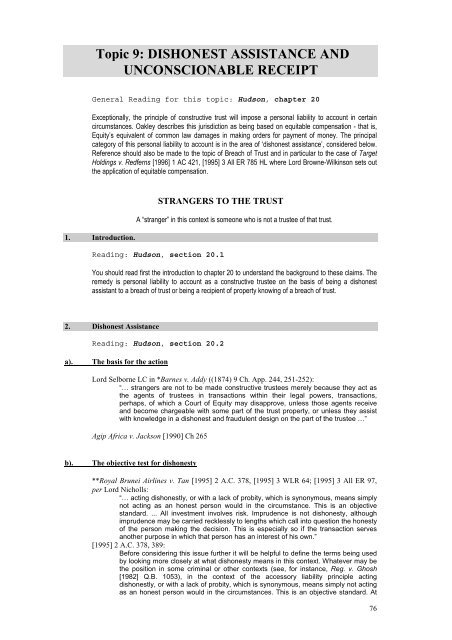Soton Equity and Trusts - alastairhudson.com
Soton Equity and Trusts - alastairhudson.com
Soton Equity and Trusts - alastairhudson.com
Create successful ePaper yourself
Turn your PDF publications into a flip-book with our unique Google optimized e-Paper software.
Topic 9: DISHONEST ASSISTANCE AND<br />
UNCONSCIONABLE RECEIPT<br />
General Reading for this topic: Hudson, chapter 20<br />
Exceptionally, the principle of constructive trust will impose a personal liability to account in certain<br />
circumstances. Oakley describes this jurisdiction as being based on equitable <strong>com</strong>pensation - that is,<br />
<strong>Equity</strong>’s equivalent of <strong>com</strong>mon law damages in making orders for payment of money. The principal<br />
category of this personal liability to account is in the area of ‘dishonest assistance’, considered below.<br />
Reference should also be made to the topic of Breach of Trust <strong>and</strong> in particular to the case of Target<br />
Holdings v. Redferns [1996] 1 AC 421, [1995] 3 All ER 785 HL where Lord Browne-Wilkinson sets out<br />
the application of equitable <strong>com</strong>pensation.<br />
1. Introduction.<br />
STRANGERS TO THE TRUST<br />
A “stranger” in this context is someone who is not a trustee of that trust.<br />
Reading: Hudson, section 20.1<br />
You should read first the introduction to chapter 20 to underst<strong>and</strong> the background to these claims. The<br />
remedy is personal liability to account as a constructive trustee on the basis of being a dishonest<br />
assistant to a breach of trust or being a recipient of property knowing of a breach of trust.<br />
2. Dishonest Assistance<br />
Reading: Hudson, section 20.2<br />
a).<br />
The basis for the action<br />
Lord Selborne LC in *Barnes v. Addy ((1874) 9 Ch. App. 244, 251-252):<br />
“… strangers are not to be made constructive trustees merely because they act as<br />
the agents of trustees in transactions within their legal powers, transactions,<br />
perhaps, of which a Court of <strong>Equity</strong> may disapprove, unless those agents receive<br />
<strong>and</strong> be<strong>com</strong>e chargeable with some part of the trust property, or unless they assist<br />
with knowledge in a dishonest <strong>and</strong> fraudulent design on the part of the trustee …”<br />
Agip Africa v. Jackson [1990] Ch 265<br />
b).<br />
The objective test for dishonesty<br />
**Royal Brunei Airlines v. Tan [1995] 2 A.C. 378, [1995] 3 WLR 64; [1995] 3 All ER 97,<br />
per Lord Nicholls:<br />
“… acting dishonestly, or with a lack of probity, which is synonymous, means simply<br />
not acting as an honest person would in the circumstance. This is an objective<br />
st<strong>and</strong>ard. ... All investment involves risk. Imprudence is not dishonesty, although<br />
imprudence may be carried recklessly to lengths which call into question the honesty<br />
of the person making the decision. This is especially so if the transaction serves<br />
another purpose in which that person has an interest of his own.”<br />
[1995] 2 A.C. 378, 389:<br />
Before considering this issue further it will be helpful to define the terms being used<br />
by looking more closely at what dishonesty means in this context. Whatever may be<br />
the position in some criminal or other contexts (see, for instance, Reg. v. Ghosh<br />
[1982] Q.B. 1053), in the context of the accessory liability principle acting<br />
dishonestly, or with a lack of probity, which is synonymous, means simply not acting<br />
as an honest person would in the circumstances. This is an objective st<strong>and</strong>ard. At<br />
76













